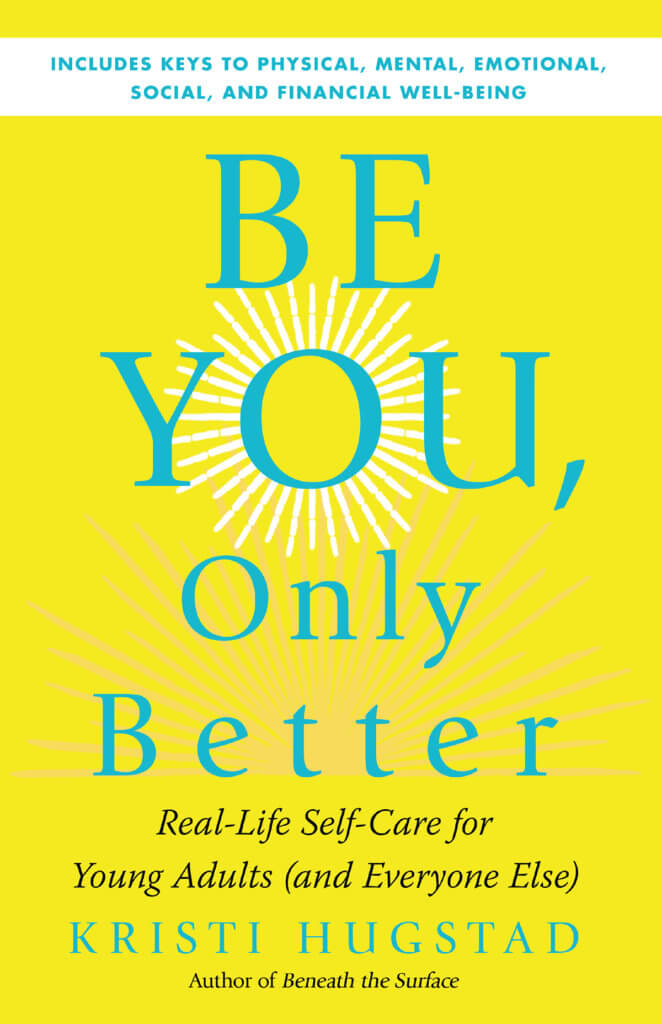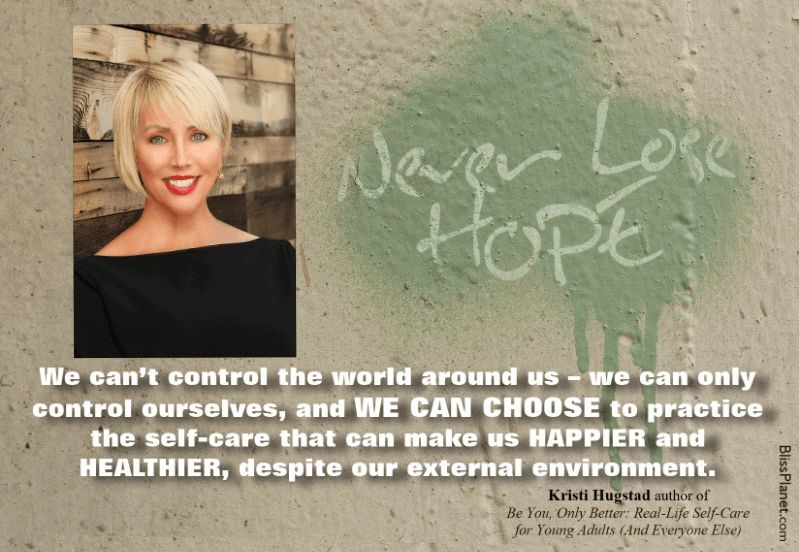Even before the coronavirus hit, today’s teens and young adults were already facing intense mental health challenges like academic stress, substance abuse, eating disorders, financial insecurity, anxiety, and depression — just to name a few.
When you add in tough pandemic realities like virtual learning, social distance from family and friends, and the loss of employment opportunities many are facing, it’s no wonder that so many individuals are feeling more isolated, afraid, and stressed than ever before.
The new book Be You, Only Better: Real-Life Self-Care for Young Adults (And Everyone Else), introduces today’s young people to simple, yet powerful day-to-day practices that promote mind and body wellness. With simple, straightforward tactics — like journaling, mindfulness, healthy sleep, and sound nutrition — author Kristi Hugstad empowers young and old alike to take charge of their own wellness. We hope you’ll enjoy this Q and A with Kristi about the book.
Your book Be You, Only Better introduces teens and young adults to simple, yet powerful self-care practices. Why is self-care more important than ever right now?
When I wrote Be You, Only Better, I certainly did not foresee a global pandemic that would change everything. But that’s exactly why self-care is so important. We can’t control the world around us – we can only control ourselves, and we can choose to practice the self-care that can make us happier and healthier, despite our external environment.
It’s no secret that teenagers and young adults are struggling today. While teen depression, anxiety and suicide rates have increased dramatically over the last decade, the pandemic has made the situation even worse. Young people need a lifeline – and often, that lifeline is within themselves. That’s really what this book is about – showing young adults healthy ways to cope and providing the resources necessary to be the best version of themselves possible.
Journaling is one of the first self-care practices you offer in the book. Why is this important for young people to do?
Today, more than ever before, we lack the time and discipline to quietly sit and reflect. Information and entertainment has never been so easily accessible – often coming to us without much (if any) effort on our parts. Daily journaling forces you to sit with your thoughts and reflect on your life and situations you may not otherwise see clearly.
Young adults, in particular, can benefit from journaling because it creates an inner dialogue and promotes mindfulness – both of which build confidence and self-awareness. Journaling provides benefits that are great for anyone but particularly healthy for young adults like boosting emotional intelligence, strengthening self-discipline, increasing memory and comprehension and providing healing, just to name a few.
You say that good sleep is an important aspect of self-care. What advice do you have to offer to those who have a hard time sleeping?
Learning to prioritize sleep when you’re young is a skill that will serve you your entire life. Part of “prioritizing” sleep mean letting go of what may be preventing a good night’s sleep. That’s much harder than it sounds, because all of us really like things that tend to prevent restful sleep – caffeine, staying up late, sleeping in late, scrolling social media or watching TV in bed.
More than anything else, I’ve found that setting a sleeping schedule – and actually sticking to it by removing the obstacles that keep me from restful sleep – is key. Readying yourself for sleep is a foundational habit, so embracing it as a young adult can set you up for a healthier, happier and more successful future.
What advice do you have to offer people who are having a hard time getting motivated to exercise?
Exercise is another foundational habit that can be difficult to form – particularly if it’s new to you. As a Pilates instructor, former gym owner and lifelong exercise enthusiast, I can honestly say I’ve never seen someone regret a workout! Sure, it can be uncomfortable or intimidating to start exercising. That’s why I always encourage people – and especially young people – to find something they truly enjoy doing. Not all of us truly love running seven miles a day – but you just might! Or you may prefer dancing, paddle boarding, yoga, cycling, hiking… the list is endless! Make the goal to try out various physical activities; chances are that there’s a form of exercise out there waiting for you to love it.
One of your chapters is about hope. What advice do you have to offer those who are feeling hopeless?
There is power in hope. Hope is motivation. Hope is optimism. Hope is the belief that good things will happen – and they’ll happen to you. When you feel hopeless, you’re less motivated to take action or control of your life, which in turn makes you feel even more hopeless. When people are in that vicious cycle, the most important thing they can do is get outside help. Whether that means talking to a close friend or finding a professional therapist, sometimes it takes an external force to help you find hope.
Often, another person can give you a fresh perspective and the motivation to move forward – which is exactly what hope is.
What advice do you have for parents who are hoping to empower their teenager to practice self-care?
Often, what parents find frustrating about their teen is the very thing that can transform their lives for better – fierce independence. Teens need love and support and someone who believes in their ability to take care of themselves.
I always advise parents to set realistic expectations for their teens. While we may be culturally expected to “do it all,” that’s not doable at any age. Help your teen prioritize their academic and extracurricular activities, making sure they still have time to properly sleep, stay active and socialize (which is also important!). Most importantly, lead by example! Make sure your teens see you taking the time to ensure your needs – physical, mental and emotional – are met.

Kristi Hugstad is the author of Be You, Only Better: Real-Life Self-Care for Young Adults (And Everyone Else) and two other books. A certified grief recovery specialist and a grief and loss facilitator for addicts in recovery, Kristi frequently speaks at high schools. She is also the host of The Grief Girl podcast and lives in Orange County, California. Visit her online at thegriefgirl.com.





